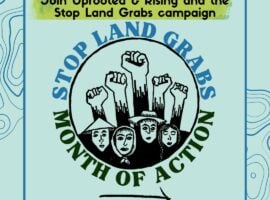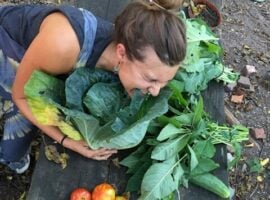Healthcare workers are heroically fighting the COVID-19 pandemic the best they can, improvising and innovating, despite federal disinvestment, the deprioritization of science, and a mentality of corporate profit over people. They are working tirelessly while putting their lives on the line — as are food workers and food producers. Since the beginning of this crisis, while many of us have transitioned to stay home, they have remained hard at work to provide for our survival. Similar to the healthcare system, our food system has been radically underfunded and under prioritized, with corporations and profitization driving decision-making.
The 21+ million members of our food system are ready to continue growing, raising, catching, processing, and delivering the healthy food we need. They are all essential workers. Without them, none of us will eat. In order to get through this crisis and lay a stronger foundation for our future as the climate changes and pathogens evolve, we must guarantee the most basic of human rights — the right to food. We must invest in our farm and food system, from farm and boat to plate, and take care of the farmers, ranchers, fishers, farm- and food-workers who are providing the essential service they can deliver at this critical time: feeding their communities. And we must ensure a living wage for all Americans, especially those whose labor is essential to moving food to all of us.
While our nation’s farmers and food workers labor tirelessly to put fresh, healthy food on our tables they must also navigate a system that is rooted in inequities that continue today. The theft of land from indigenous peoples, and the subsequent kidnapping and enslavement of people from Africa to work the land, laid the foundation for a food system based on extraction from people and the land. Small and mid-sized farms and fishing operations struggle to survive in a system designed to support corporations that put profit over people and the planet. Food and farm workers bear the brunt of these hazardous working conditions and unfair pay. All have been failed by federal farm and fisheries policies, especially farmers, ranchers, and fishers of color, tribal nations, and the workers who have been excluded from protections of the Fair Labor Standards Act.
Even before the pandemic, 37 million people – including 11 million children – were struggling to have enough food to eat, while 4 out of 5 U.S. workers were living paycheck to paycheck . Food workers themselves were twice as likely to be dependent on food stamps due to poverty-level wages.
The truth is that lack of access has never been about a lack of food – it’s been a problem of distribution, with people of color and tribal nations across all sectors impacted disproportionately. As the pandemic threatens to strip even more families of their income, more will be unable to afford healthy, safe and nutritious food in the near future. To meet these dual needs of 1) ensuring equitable access of food for all AND 2) supporting the people, not corporations, behind the production, procurement, and distribution of food, National Family Farm Coalition (NFFC) , Northwest Atlantic Marine Alliance (NAMA) , WhyHunger , Farm Aid , HEAL Food Alliance , and Institute for Agriculture Trade and Policy (IATP) call on Congress to ensure that any stimulus package prioritize the following:
- CENTER THE FARMERS, RANCHERS, FISHERS, AND FOOD WORKERS OF COLOR WHO ARE MOST IMPACTED BY SYSTEMIC INEQUITIES OF OUR FOOD SYSTEM
- ENSURE A FAIR AND SAFE LIVELIHOOD FOR FARMERS, RANCHERS, FISHERMEN AND ALL FARM, FISH, AND FOOD WORKERS
- BOLSTER LOCAL & REGIONAL FOOD SYSTEMS POISED TO FEED COMMUNITIES
- ENACT SYSTEMIC REFORM TO BUILD RESILIENCE FOR ALL PRODUCERS, WORKERS, AND EATERS
- PROTECT SMALL AND MID-SIZED FARMS AND FISHING OPERATIONS FROM CORPORATE MERGERS AND ACQUISITIONS. NO ONE SHOULD LOSE THEIR FARMS OR BOATS.
- ENSURE EVERY PERSON LIVING IN THE UNITED STATES HAS A DIGNIFIED MEANS OF ACCESSING NUTRITIOUS FOOD
To read a comprehensive list of our proposal, we’ve compiled our policy recommendations here.
CONTRIBUTORS:






